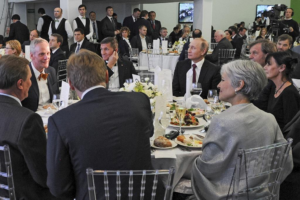During the 20th century, American women actually fought for their right to vote, not realizing that less than one hundred years later, cynicism about the political process would be more widespread than the likelihood that people would bother to show up at the polls. Political cynicism has become a cottage industry in the United States, resulting in millions of dollars spent on jokey T-shirts, masks, stickers, and other paraphernalia. The idea of investing honestly in politics is as old-fashioned as a rotary dial telephone: these days, it’s all about making a buck off cynical merchandise at the expense of the country’s future.
Consider the wild popularity of Donald Trump paraphernalia versus the relative popularity of the candidate himself. The ghostwriter of Trump’s “The Art of the Deal” recently claimed Trump is a sociopath, but this doesn’t prevent merchandisers from making a small fortune off his ghastly orange pallor, electric-shock hairstyle, and nonsensical policy statements. The former television host turned presidential candidate has largely gestured and grunted his way into the political realm, creating an inexhaustible supply of T-shirts, hats, mugs, even cell phone cases that bear his image. Because Trump largely speaks in sound bites, he opens himself up to mockery and is the cynical retailer’s dream.
Of course, people aren’t making a buck merely off the tide of anti-Trump sentiment. Regardless of their actual personal political leanings, many retailers shamelessly stock their shelves with both pro and anti-Trump items. In the United States, it’s no challenge to find an outlet that will support any political inclination, provided that inclination can be sold and taxed. It seems that the purpose of the political process, which is the communal engagement with pressing social and economic issues, has largely been reduced to a point of sale purchase where the slogans are meant to engender a laugh, not any serious discourse.
How far does this attitude go? Sadly, this cottage industry is not limited merely to real candidates. The deep cynicism about the political process has spread into cinema as well. Consider the success of the “Vote for Pedro” T-shirts, which originated from the movie “Napoleon Dynamite.” The movie, which celebrated the unlikely rise of an awkward youth at a high school in a rustic setting, has perhaps inadvertently become the touchstone for a generation of people who never really saw politics as anything but an overhyped distraction. The notion of true civic engagement rarely makes it into films, and “Napoleon Dynamite” is no exception. This film is more about the power of bonding between teenagers, which is why the continued popularity of “Vote for Pedro” has nothing to do with the thorny aspects of reality and everything to do with the perpetuation of a kinder, gentler, less responsible period in a person’s life. It is the celebration of adolescence far into middle age, and as such acts as a kind of gentle but still pervasive cynicism. Politics, the wearers of this shirt seem to acknowledge, have nothing to do with us because we are not part of a larger community. We bear no responsibility for our country, because our country is inherently insular and solipsistic.
What is more politically cynical than to abandon the idea of democracy itself? Judging by the proliferation of Donald Trump masks in China, political cynicism has graduated from a simple attitude into a fully-fledged international industry, replete with chintzy knock-offs and half-baked memes on poorly printed T-shirts. The U.S. was once proud to spread democracy; now, it seems, it only has the energy to export the jaded rictus of a nation that has traded mockery for engagement. Of course, Hillary Clinton has also provided a minor industry but not to the same degree.






